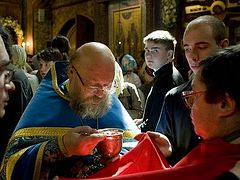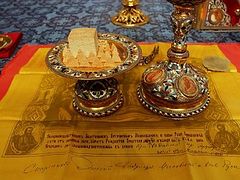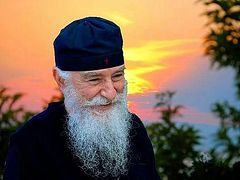The Mysteries or Sacraments of the Church are the very center of the Orthodox life, beginning with Holy Baptism and Chrismation and culminating in Holy Communion. In the Mysteries we meet God Himself and thus we are called to believe and prepare for participation in them, to the salvation of our souls.
In the summer of 2013, Elder Joseph, abbot of Xeropotamou Monastery on Mt. Athos, offered a lecture to a group of American seminarians gathered in the Greek village of Petrokerasa, outside Thessaloniki concerning the "presuppositions" that ought to met in order to participate in the Sacraments of the Church. His words come from his deep experience on Mt. Athos and throughout Greece, addressing contemporary issues in Church practice:
* * *
As all of us should know, and hopefully do know, that just because we are formally Orthodox does not mean we have the right to participate in the Sacraments, or Mysteries, of the Church, but rather, there are preconditions to participation—that is, we are called to prepare ourselves to receive grace and meet the Lord through these Mysteries.
When we say “Mysteries” in the plural, it typically refers to all the other Sacraments except for the Eucharist, which holds a place of distinction of its own, being the very summit of the Christian life. Unfortunately we have many secularized Christians who do not ascend this height, but rather go to church but to light a candle, or to services such as Weddings and Baptisms and funerals, and perhaps even Nativity and Pascha, but this remains the extent of their life in the Church, especially among the cradles. This tends to be more common among the cradle Orthodox. I think that this issue is more prevalent in the Greek Church—this is a common conversation among Greek priests—but the way in which we confront and solve this problem could have wider spiritual implications for Orthodox worldwide, for better or worse.
The issue here is the general problem of secularization, where the Mysteries tend to become more or less social events. Even priests, given the way that the Mysteries are celebrated, are unable to pray, because no one else is praying or paying attention. Even the priest is affected. One issue here is that the Mysteries were formerly celebrated during the Divine Liturgy, but with their separation came a degradation of proper piety and approach. If the Sacraments would return to the Liturgy, which would mean tremendous liturgical changes, then they could once again properly serve as boundaries of the Church.
Of course the Church does have its boundaries which are not confused or blurred: the Orthodox faith and indeed the Mysteries, firstly Holy Baptism. That which confuses the boundaries is that there are those faithful who commune and those who remain outside of communion—the ex-communicants. A lack of faith, lack of catechizing, and general worldliness are the causes of these lukewarm Christians staying away from the Eucharist, coming only for the other Mysteries. They don’t know how to pray; they don’t have or understand proper piety. These are people outside the Church, of the phenomenon of worldliness.
That the Holy Mysteries might not degrade into secularized empty forms, but that the faithful might be truly prepared that the Mysteries might truly impart the grace of the Holy Spirit, there are certain conditions to be met:
- Celebrants and participants must dispose themselves in a prayerful state of mind;
- They must understand and believe what they pray—they must have faith;
- They must adhere to Christian morals and the Patristic and canonical Tradition of the Church—Christ says If you love Me you will keep My commandments, and Divine worship is an expression of love for Christ;
- Participants must not be ex-communicants (that is, not separated from Christ by grave sin) and must comply with the rules of reverent behavior and apparel in Church.
In Greece many people participate in the Sacraments without repentance and without the presuppositions of participation, or they go to the other Mysteries but they do not commune. People are being allowed to participate in the Mysteries without repentance. In practice they are not part of the Church. Pious priests are trying to give them an opportunity to begin to come to church and have repentance. Most of them are not responding to the efforts of the priests because they are secularized, not believing in the Mysteries of the Church, and the presuppositions are not there. The question is, as priests, do we do well by going along with this or not?
Ordination to each level of the priesthood—diaconate, priesthood, and episcopate—occurs at a specific point in the Liturgy such that after it comes something which highlights that specific ministry. Priests are ordained in the Divine Liturgy before the sanctification of the Holy Gifts. After the descent of the Holy Spirit at the sanctification the bishop gives the priest the holy Body of Christ to hold in His hands as he stands behind the holy altar. He is to take this deposit of faith (parakathiki) and keep it, having reverence for it. This deposit will be asked of the priest at the Second Coming of Christ—be careful! It is the priests who are called to discern who to give the Eucharist to, and who not. We must judge whether the people coming have fulfilled the presuppositions for participating in the Mysteries. This is a tremendous responsibility.
So why do we give the Mysteries to people who don’t understand or respect them? It’s a huge problem for the Church today.
Lex orandi, lex credendi—“the law of prayer is the law of belief”—is an early theological maxim expressed in the Church that of course we still hold to today. Prayer is a way of establishing common belief—if everyone is praying in common they will believe in common. Prosper of Aquitaine, a disciple of St. Augustine of Hippo, writes, “Let us consider the sacraments of priestly prayers, which having been handed down by the apostles are celebrated uniformly throughout the whole world and in every catholic Church so that the law of praying might establish the law of believing.” And vice versa: in order to be salvific, our Orthodox Mysteries are preconditioned by Orthodox faith.
There are several preconditions for participation in the Mysteries of Baptism, Repentance (Confession), and Holy Unction, the most essential of which is catechism. With infants this essential indoctrination is deferred to truly Christian parents. The sponsor is not the one who will actually teach the faith—he oversees and stands between the Church and the family, and his role is to intercede when he sees that catechism is not taking place, but not to actually carry out the catechesis.
The catechism that takes place for young children, around four or five years old, has much potential. These years are filled with potential because these young children are experiencing the life of the Church, and seeing experientially the faith of the parents is key. What happens when parents aren’t living according to the faith and the life of the Church? It becomes obvious that clergy need stricter discernment of what couples can baptize their child. In the First Matins Gospel we are instructed to go into all the world, preaching the Gospel, and he who believes and is baptized will be saved. If one is going to believe then he has to be taught.
Someone once came from Australia to our monastery on our feast day. He was an unbeliever, or somewhat disinterested. He said he had been recently baptized, probably without any kind of catechism, and very disturbing things were happening to him. He felt a snake was coming after him, for example. What does this teach us? He was not catechized and did not actually believe properly. The things happening to him usually happen to people before Baptism. The devil bothers those who don't have the grace of Baptism. I told him to go to those who baptized him and get catechism, and he believes then those things won’t happen.
Regarding the Sacrament of Repentance, or Confession, it should be known that every baptized Orthodox Christian can confess whether he is communing or not. There is an issue here because different Local Churches have different prevailing approaches. Some say that Confession is mainly for those who are bearing quite serious sins and that you can commune more often with less frequent Confession if you have no serious sins. The Greek practice generally is that for small falls of thoughts and words you can continue to commune and confess later, but the Slavic practice doesn’t make this distinction. For them you should confess every time before Communion, which means you confess more often but each time is probably quicker. This is a more secure route for the priest, but also means that people don’t commune as often in practice.
The question before us is: where does economia end and where do we begin to actually reward a lack of repentance? How much are we helping and how much are we hurting the faithful? It depends on how we employ the canons on repentance. If we end up giving up a blessing to commune to all, including those with grave sins, then we’re actually rewarding those who do not repent. We must apply penances with discernment and economia, but always with the criterion that they are truly repenting. You have to see the fruit of them not sinning, otherwise you’re rewarding sin.
 Xeropotamou Monastery, Mt. Athos
Xeropotamou Monastery, Mt. Athos There is sometimes confusion between Confession and spiritual direction, with spiritual fathers sometimes giving small, detailed commands for daily life. This is something not appropriate for the laity, and the result is that many, from a feeling of pressure, find themselves further from the Church. For the laity all the general commandments of Christ are to be enforced, which means that spiritual father and priests should constantly remind their people of the commandments. If there is weekly preaching, more or less, then Confession can be reserved for confession of sins and giving of penances, instead of trying to do a lot of teaching during the Mystery.
The foundation for the Mystery of Holy Unction is readily apparent in the Epistle of St. James where we read of an anointing for the sick. To the paralytic brought to Christ through the roof of the house, He pronounced the forgiveness of sins before instructing him to take up his bed. In the Old Testament it was clear that sickness was a result of sin, and this is also clear in St. James’ Epistle, and the Church understands this, which is why the seven prayers of Unction speak continually of the remission of sins.
Is there remission of sins by Unction without the Sacrament of Confession? One of the presuppositions is that the people are confessing, repenting, and have come to understand their sins. The fact that they went to Confession would indicate that they have come to an understanding of their sins. If you go only to Unction and think that your sins are remitted then you don’t have self-knowledge and don’t understand your sins.
Many are confused by the fact that at Pascha and Nativity there is often Unction served in Church for all people before the feast, but it must be understood that the preceding fasting period was aimed at repentance and preparation for the feasts, which is why Unction is offered then. Also, it’s practical, as a priest simply can’t go to every individual house. Unction is not for the healthy or for those who commune regularly, but for the sick and those coming to repentance and who would like to commune at the feast. They fast, confess, receive Unction, and then they commune. This mistaken conception of laymen and practice of priests often results in people thinking the Mystery is simply for general well-being.
Regarding the Mystery of Baptism—first of all, the proper form is full immersion, in a font big enough for the whole body. Also, the exorcisms before the Sacrament can actually happen many times, not necessarily only just before Baptism. We know someone is ready for Baptism when he is living a moral life. This is the living confession of the catechumen. This should be examined by the priest throughout the catechumenate, although there is no formal prayer for the remission of sins. In the ancient Church people were often catechumens for many years. Some were baptized quickly, but others took longer to begin to live the appropriate life. All were called Christians, however, because they had accepted the Christian teaching.






